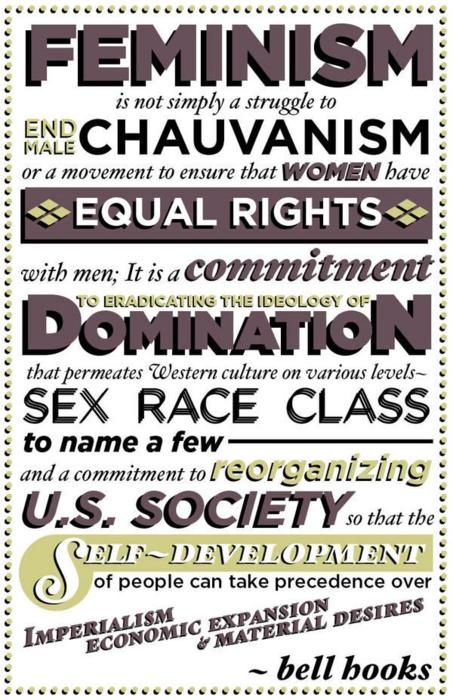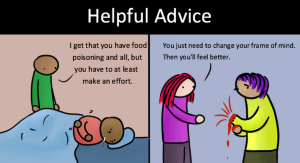Most people have a somewhat old or just inaccurate notion of what feminism is about. It’s definitely evolved over the decades and each generation has developed it in new directions. In fact, there isn’t a single feminism but many feminisms.
At Everyday Feminism, we’re promoting what we see as the heart of all the feminisms. And it’s probably not the definition you were expecting.
What Feminism Means To Everyday Feminism
It supports us in questioning what we’ve been taught about forcing people into traditional roles and valuing some groups less than others.
It helps us to understand why some people hate, abuse, exploit, discriminate, and silence certain individuals and communities.
It helps us stand up against oppression and demand justice.
By engaging in feminist thinking and action, we can free ourselves to make meaningful choices in how we live our lives and pursue what makes us happy and fulfilled as human beings.
Feminism identifies discrimination, exploitation, and oppression — and not men (contrary to a wildly incorrect popular belief)— as the problem. Living in patriarchal, homophobic, racist, and classist societies, we are conditioned to perpetuate sexism, homophobia, racism, and classism.
Both men and women can try to dominate each other and be dominated, rewarding and punishing according to how much they fit into traditional definitions of gender, sexual orientation, race, and class. Feminism strives to free people of these beliefs.
It aims to create a world where there is no domination, where people are valued for being who they are fully and freely. To create such a world, all forms of oppression need to end – sexism, racism, classism, homophobia, transphobia, ageism, ableism, etc.
How Feminism Evolved To Be For Everybody (and Not Just Women)
While feminism began focused more solely on issues related to being a women, women do not experience their lives as merely women but also as women of different races, classes, sexual orientation, and other groupings. There was a backlash within the feminism movement who felt it overly represented issues of white, upper class women.
This led to feminism expanding its focus to understanding how all these groupings of different power and privilege intersect to shape the everyday lives of women. Over time, this has led to seeing how essentially everyone – men and women – is mistreated and exploited in socially acceptable ways due to their social status.
Just as women in the beginning of the feminist movement fought to have their voice and perspective included and valued, feminism today fights to include the voice and perspectives of all groups who experience dominance in our society – which is pretty much every single person.
Feminism Is For Men Too
Feminism also acknowledges how patriarchy and other forms of social hierarchy can hurt men while giving them benefits at the same time. It calls for them to dominate, abuse, exploit, and silence women and others in order to maintain superiority and the traditional roles for women and men. But most men, in their hearts, do not want to treat women like this.
They do not believe their self-worth and masculinity is tied to how many women they have sex with, how physically strong they are, and how many people they can beat up. But they are socially encouraged to do so and fear punishment from other men if they stand up to those beliefs. Feminism is as much for men as it is for women in order to free them from the sexist and oppressive beliefs that they don’t want to have.
Men are also pushed into conforming to their traditional gender roles and socially punished when they don’t. For example, men are expected to not express their feelings because real “boys don’t cry”. They’re socially encouraged to only express their fear, pain, and stress in the form of anger and violence. Another example, is how due to traditional gender roles, society thinks women are automatically better parents than men, despite the numerous examples of bad mothers and great fathers. Feminism believes each person should stand on their own merit – not by how much they conform to social norms and ideals.
For men of color, LGBTQ, or other marginalized communities, they both experience dominance in the broader society and are in positions of greater power over others as well. Just like women of different race/ethnicity, class, age, and other forms of social status.
In the end, we’re all fighting for human rights.
Sounds Like Something You Agree With, Right?
You may have just read more about feminism than you’ve ever read before. For some people, this will be the first time that they have heard a feminist describe feminism. Doesn’t seem so crazy, huh? Kinda makes sense, doesn’t it?
It does make sense but it still isn’t easy. Being anti-sexist and anti-oppression towards yourself and others is an ongoing process where you work toward being a more compassionate, ethical, and responsible person and community member.
At Everyday Feminism, we help people question what they were taught to be “true” and make a meaningful choice in how to think and act around these issues. We want to create mutually supportive spaces where people work to understand, share, and care about the others in the community.
Still Don’t Believe Me?
Still not sure if this is really “feminism”? Check out Feminism Is For Everybody by bell hooks, a very prominant and well-respected feminist. It may help you see the difference between what society thinks feminism is and what one of the most influential thinkers in feminism says.
Sandra Kim is the Founder & Editor of Everyday Feminism. She brings together her personal and professional experience with trauma, personal transformation, and social change and gives it all a feminist twist.
Search our 3000+ articles!
Read our articles about:
Our online racial justice training
Used by hundreds of universities, non-profits, and businesses.
Click to learn more





















